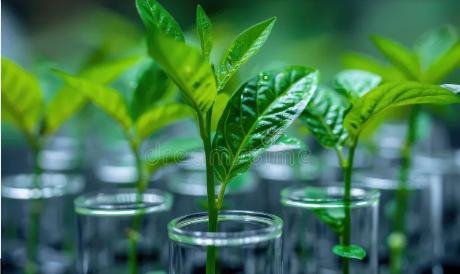
Agriculture & Biotechnology
Biotechnology in Agriculture is also known as agritech, is an area of agricultural science involving the use of scientific tools and techniques including genetic.
The Pakistan Atomic Energy Commission (PAEC) is using Nuclear Technology to help improve farming in Pakistan. It has developed new types of crops, better ways to control pests, improve soil and water use, keep animals healthy, and make food safer and last longer.
Biotechnology in Agriculture improves crops and livestock using biotechnology tools.
PAEC also helps farmers by organizing special events like “Farmer’s Days” and field visits. These programs teach farmers about new crop varieties, modern farming techniques, and ways to save water. This helps them grow more food and improve their farming methods. There are some major uses of biotechnology in agriculture.
Biotechnology in Agriculture is the use of new scientific techniques based on our understanding of DNA to improve the production of crops.
Development of New Crop Varieties
The Pakistan Atomic Energy Commission (PAEC) is developing new types of crops using different scientific methods. These include traditional breeding, mutation breeding, genetic engineering, and marker-assisted selection.
The goal is to create crops that produce more food, have better quality, can survive in tough conditions, and grow in different areas. So far, PAEC’s Agriculture and Biotechnology Institutes have developed over 150 crop varieties, which are widely used by farmers in Pakistan.
Using Salty Land for Farming
The agriculture and biotechnology institutes of PAEC have developed special methods to use land that has too much salt. They provide these methods and special plants to local farmers and even to other countries.
The main goal is to make salty land useful for farming while also improving its condition over time. This helps farmers grow crops and earn money from land that was previously not useful.
Plant Nutrition and Water Management
Water shortage is a big problem that affects farming and food production. Using too much fertilizer is also harming the soil and the environment.
PAEC has developed better ways to use water efficiently in farming, reducing water waste. They have also found cheaper and better nutrient sources for plants, helping farmers use less chemical fertilizer while keeping the soil healthy.
Reducing Crop Losses from Pests and Diseases
One way to increase farm productivity is by reducing the damage caused by pests and diseases, both in the field and after harvest. PAEC Institutes have introduced methods to breed large numbers of helpful predatory insects that naturally control harmful pests in crops.
Scientists have developed and shared new technologies with farmers to help them manage pests using an integrated approach. Research in food irradiation has also helped improve food storage by increasing shelf life, removing harmful contaminants, and reducing waste. These efforts help farmers protect their crops and reduce losses.
Increasing Export Opportunities
Exports are very important for a country’s economy. Since 70% of Pakistan’s exports come from agriculture, any improvement in this sector helps the country grow.
To support exports, services are provided to remove harmful substances from food using irradiation. Experts also test food and dairy products for aflatoxins and drug residues. Additionally, researchers use DNA testing to check the quality of Basmati rice and identify genetically modified crops. These efforts help improve the quality of export goods and make them safer for international markets.
Training and Skill Development
Agriculture and Biotechnology Institutes train people through courses, workshops, and internships. They organize about 40 training programs each year to teach the latest techniques in agricultural research.
Because of PAEC’s continuous efforts to build skilled research teams, the International Atomic Energy Agency (IAEA) has recognized NIAB as a ‘Collaborating Centre’ for Nuclear Techniques in Food and Agriculture. These training programs benefit researchers, students, and teachers from both national and international organizations and universities.
Additionally, NIAB and NIBGE work with PIEAS to offer MPhil and PhD degrees in Biology and Biotechnology.

Leave a Reply